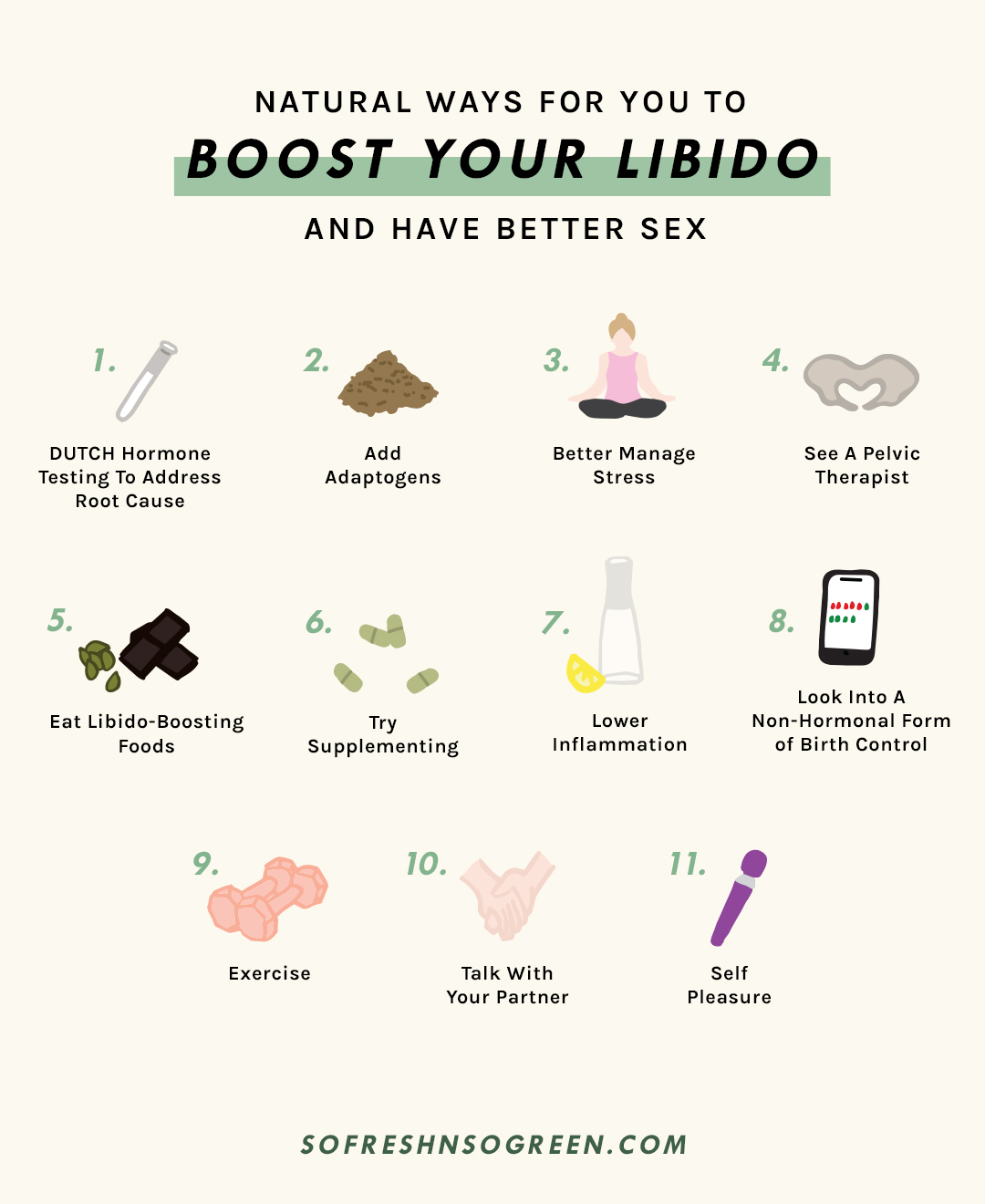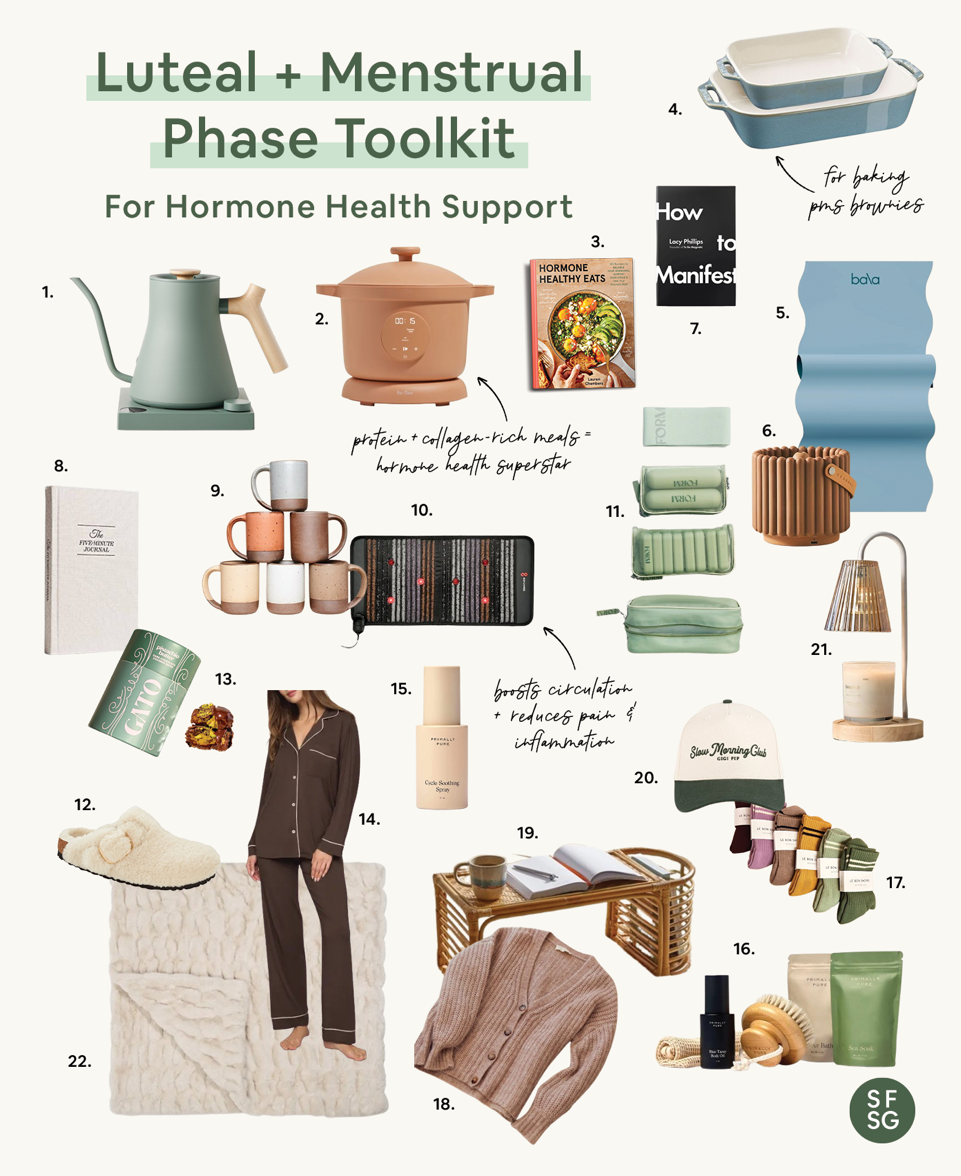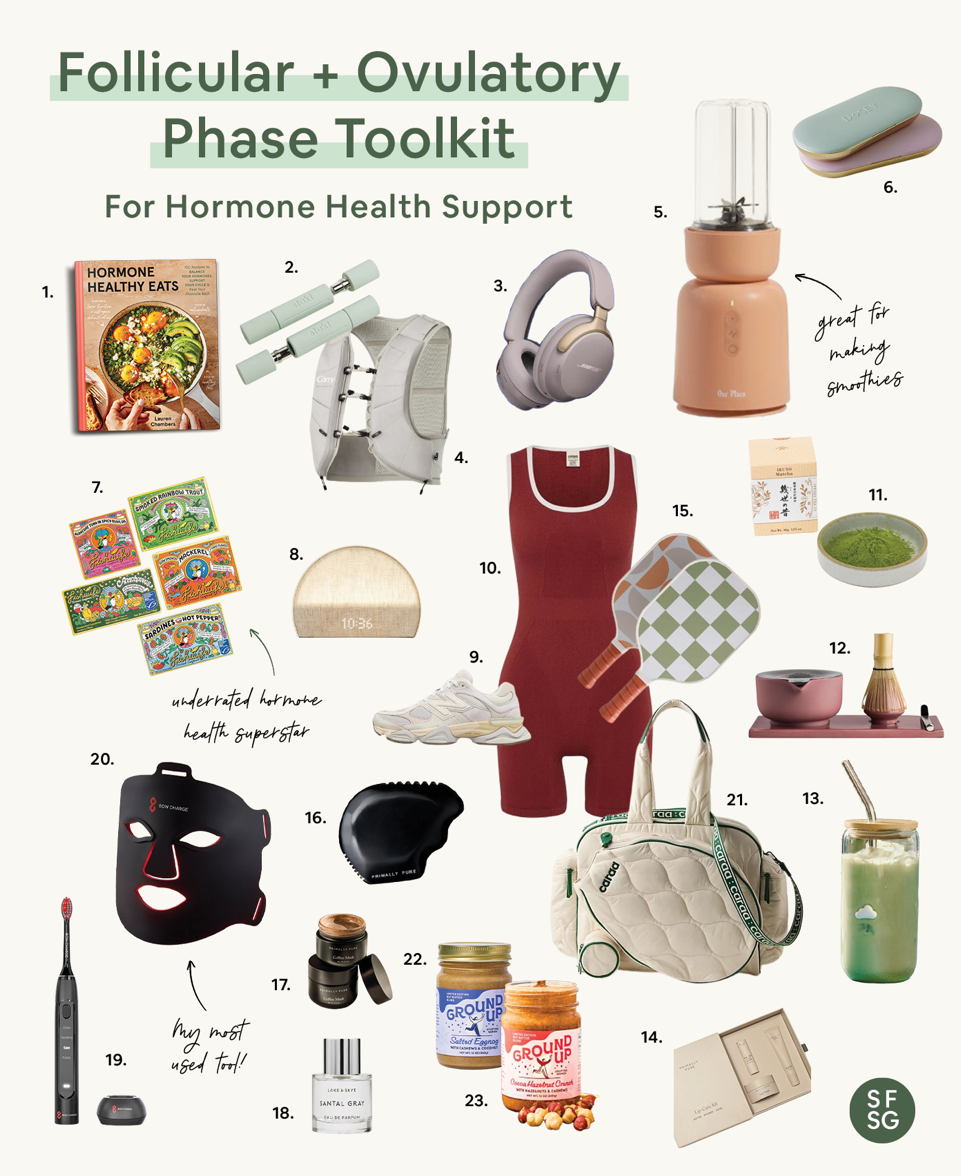recipes
lifestyle
wellness
motherhood
mindset
About
E-Books
Blog
Freebies
partnerships
hi, i'm lauren!
hey there!
I’m on a hot mission to help you balance your hormones & live your best life.
categories
Home
Quiz
Get In Touch
The Course
search:
Cookbook
Recipe key
GF
VG
P
Vegan
Gluten Free
Paleo
DF
Dairy-Free
download now
Join Hormone Healthy Eats!
Become a SFNSG insider to get my monthly Substack, Hormone Healthy Eats! Packed with the latest hormone-healthy recipes
+ tips.
jump to recipe >
As a mom of a 16-month old and someone who’s had her fair share of hormone imbalances (hypothyroidism, dysmenorrhea, etc.) let’s just say my libido has been through quite the ringer!
While I’m not alone in this (in a recent study 36% of women in the US reported low sexual desire while 60% said they were sexually unsatisfied) I’m not down with it either. Just because a symptom is common does not mean it’s normal. A healthy libido is a sign of healthy hormone balance, and when it feels off it’s our body’s way of telling us something bigger is off as well.
So I thought it was high time to dive into this topic, as embracing our female sexuality is incredibly empowering and innate. All women deserve to have good sex, intimacy and connection, no matter where you’re at in life, and I hope this post can be used as a resource to help you get there!
DO YOU HAVE A LOW LIBIDO? HERE ARE THE SYMPTOMS TO LOOK OUT FOR
Alright, I think it’s pretty obvious when your libido is low you’re rarely in the mood for getting on, but there are still other symptoms that can be an indicator. They include:
+ Lack of sexual of sexual thoughts or fantasies
+ Inability to get or stay sexually aroused
+ Lack of desire to have sex, including masturbation
+ Distress due to lack of sexual thoughts or desire
+ Relationship strain with a partner due to lack of sexual thoughts or desire
You can also try taking this free quiz to explore whether or not you have a hormone imbalance that may be affecting your libido.
HOW YOUR HORMONES IMPACT YOUR LIBIDO
+ Testosterone
+ Estrogen
+ Progesterone
+ Oxytocin
Sex and orgasm release oxytocin in both women and men. It’s been shown to help decrease cortisol levels and contributes to an overall sense of wellbeing. Seriously, an orgasm is one of THE BEST stress-relievers. Women with low levels of oxytocin are more likely to have postpartum depression, so it’s especially important for new mamas to find a way to carve out regular time for pleasure and intimacy (this doesn’t have to be sex, hugging, touching/cuddling etc. all induce oxytocin).
If any of these symptoms ring true for you try taking this free quiz to explore whether or not you have a hormone imbalance that may be affecting your libido.
COMMON CAUSES OF LOW LIBIDO
You now know the symptoms and hormones directly tied to a low libido, but what are the root causes that imbalance your hormones and lead to low libido in the first place? Let’s investigate some of the most common root causes:
+ Stress
+ Feeling Overweight or Self-Conscious Thoughts
In addition to body image issues, excess weight can also have real effect’s on a person’s libido. For both women and men, high body fat can cause an increase in estrogen, which can decrease testosterone production. This is because DHEA is converted to estrogen in your body’s fat cells. Both estrogen dominance and low testosterone cause low sex drive, which can greatly compound any body image issues that may already be present.
+ Systematic Inflammation + Gut Issues
Chronic inflammation inhibits normal sex hormone and neurotransmitter production, causing the body to put more emphasis on healing instead of reproduction. This makes sense on a basic, primal level as a body that’s in poor health isn’t viable for supporting a healthy pregnancy, and thus won’t be focusing it’s energy or resources on reproduction. A person’s sex drive naturally goes down so the body can conserve its energy.
Additionally, excessive amounts of cortisol as a result of inflammation directly decrease the neurotransmitters serotonin, dopamine and noradrenaline. When levels of these hormones are low, it can result in depression and anxiety. Not only does this directly affect sex drive, but the medications that are used to treat them can also have a huge impact, causing decreased libido and a decreased ability to become aroused and achieve orgasm.
+ Healthy Amount of Body + Dietary Fat
When the body fears starvation, which can happen with significant fat loss, a diet too low in fat, or over-exercising, it doesn’t feel like having sex. Instead the body conserves energy to keep itself alive.
Sex hormone production, especially testosterone, decreases when body fat levels are below 15% in women. Cholesterol is broken down from fat and forms the backbone of sex hormones, so if body fat is low then there’s not enough cholesterol to produce these hormones, which can stop a woman from menstruating altogether.
Over-exercising, such as marathon training or intense body-building, can drive body fat levels so low that the body stops producing adequate amounts of sex hormones. The stress of over-exercising can also increase cortisol levels, which as you learned earlier keeps the body from producing sex hormones.
+ Birth Control Pills
+ Certain Medications
These medications are known to decrease libido as well as the ability to achieve orgasm:
+ Medical Conditions + Hormone Imbalances
Such as:
+ Hypothyroidism — elevates inflammation and interferes with production of sex hormones
+ Vascular Disease — decreased circulation affects both erection and clitoris stimulation
+ Depression — this causes a person to not be interested in much of anything in life, including sexual activity
+ PCOS — can cause weight gain, increased body hair, acne, irregular periods and dampen your sex drive
+ Diabetes — can affect the nerves of the vulva, decreasing sensation and diminishing the ability to lubricate and have an orgasm. In men, it can affect erections and ejaculation
+ Low Estrogen — associated with decreased clitoral sensitivity, vaginal dryness, less blood flow to the vagina and difficulty achieving orgasm
+ Pelvic Pain — including pelvic inflammatory disease, ruptured ovarian cysts, endometriosis and tubal pregnancies
+ Vulvodynia — chronic pain of the vulva
+ Ovulation Pain aka Mittelschmerz — cramp-like abdominal pain associated with ovulation
+ Dysmenorrhea — painful, heavy periods
+ Chronic Pain of Unknown Origin — correlated with IBS, chronic bladder infections, endometriosis and scar tissue
HOW TO NATURALLY BALANCE YOUR HORMONES TO BOOST YOUR LIBIDO
+ DUTCH Hormone Testing To Address The Root Cause
+ Add Adaptogens
+ Better Manage Stress
As you learned earlier, stress is a MAJOR contributor to low libido and overall hormone imbalance. While we can’t avoid stressors, we can work to create more calm in our lives. Try gentle yoga, meditation, going for a walk, being out in nature (especially barefoot), reading a good book, taking a hot bath or shower, cuddling or having sex (more on that later).
+ See a Pelvic Pain Specialist
+ Eat Libido-Boosting Foods
Girl, you know this one is my FAVE! Try incorporating more pumpkin seeds into your diet, which are rich in zinc that can help you achieve higher testosterone levels (key for libido) and help your man have healthy sperm production.
Another awesome addition is dark chocolate, which is loaded with bioflavonoids that support the circulatory system, allowing for engorgement of sexual organs, arousal, lubrication and orgasms.
+ Try Supplementing
B-Vitamins are one of my go-to’s as they’re essential to creating balanced hormones, which work to support a healthy libido. Make sure to choose an activated B-Complex that contains methylocbalamin, and read this post to get the full scoop on optimal B-vitamin supplements.
Other supplement options include L-arginine, which contains amino acids that can improve blood flow to your genitals, Yohimbine, which can improve orgasm dysfunction, and Tribulus, which can increase both DHEA and testosterone levels.
**I highly encourage you to consult with a functional medicine practitioner before taking these supplements, especially if you are currently on other medications. They will be able to help you find quality brands and proper doses for your needs.
+ Lower Inflammation
+ Look Into A Non-Hormonal Form of Birth Control
It’s well known that hormonal birth control depletes women’s libidos. In fact, research has shown that hormonal birth control, like the pill, alters the genetics of your liver and may permanently result in a lifelong missing libido. You can opt for a cycle-tracking device, such as the MyFlo app or the Daysy Fertility Tracker.
+ Exercise
Exercise helps to produce feel-good endorphins and lower cortisol levels, reducing stress and working to maintain a healthy sex drive. It’s also attributed to reducing depression, which can have a negative effect on your libido. Any form of exercise helps, as long as you truly enjoy it and are able to work it consistently into your routine!
+ Talk with Your Partner
I can give you every single libido-boosting solution out there, but if the root cause of your low sex drive is an issue with your partner, none of it’s going to have the effect you like. Try finding a way to communicate your needs and desires, while also making sure to seak out theirs too.
+ Self-Pleasure
Looking for more hormone-balance + libido-boosting support? Try my 28-Day Guide to optimize your hormone balance, health, happiness, energy, focus, sex, confidence, sleep and life!

If you loved that...

01.

02.

03.

04.

05.
hey!
Keep Browsing
Site
Keep Browsing
Site
the
about
e-books
blog
downloads
quiz
Welcome friend, I'm lauren.
I’m honored to support you on your journey to optimal hormone health + happiness. Thanks for being here babe.


